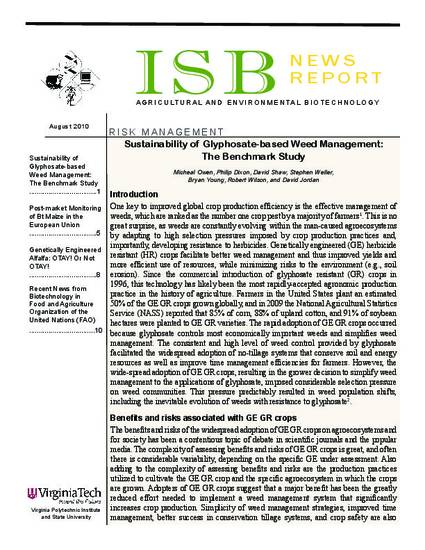
One key to improved global crop production efficiency is the effective management of weeds, which are ranked as the number one crop pest by a majority of farmers1. This is no great surprise, as weeds are constantly evolving within the man-caused agroecosystems by adapting to high selection pressures imposed by crop production practices and, importantly, developing resistance to herbicides. Genetically engineered (GE) herbicide resistant (HR) crops facilitate better weed management and thus improved yields and more efficient use of resources, while minimizing risks to the environment (e.g., soil erosion). Since the commercial introduction of glyphosate resistant (GR) crops in 1996, this technology has likely been the most rapidly-accepted agronomic production practice in the history of agriculture. Farmers in the United States plant an estimated 50% of the GE GR crops grown globally, and in 2009 the National Agricultural Statistics Service (NASS) reported that 85% of corn, 88% of upland cotton, and 91% of soybean hectares were planted to GE GR varieties. The rapid adoption of GE GR crops occurred because glyphosate controls most economically important weeds and simplifies weed management. The consistent and high level of weed control provided by glyphosate facilitated the widespread adoption of no-tillage systems that conserve soil and energy resources as well as improve time management efficiencies for farmers. However, the wide-spread adoption of GE GR crops, resulting in the grower decision to simplify weed management to the applications of glyphosate, imposed considerable selection pressure on weed communities. This pressure predictably resulted in weed population shifts, including the inevitable evolution of weeds with resistance to glyphosate2.
Available at: http://works.bepress.com/philip-dixon/7/

This is an article from ISB News Report (2010): 1. Posted with permission.